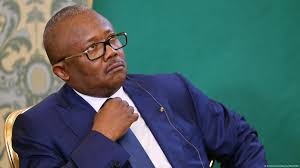Guinea-Bissau President Umaro Sissoco Embalo has officially announced that he will run as an independent candidate in the country’s upcoming November 2025 presidential election. This comes amid ongoing political instability and rising criticism over his extended stay in power.
Embalo was first elected in December 2019 for a five-year term. At the time, he promised to serve only one term. However, he later postponed the elections, pushing them to November this year—well beyond the end of his original mandate. This move triggered months of political unrest and accusations of trying to cling to power.
He confirmed his candidacy during the swearing-in ceremony of his newly appointed Prime Minister Braima Camara on Friday. Camara is a member of Madem G15, Embalo’s ruling party, and replaces opposition leader Rui Duarte Barros, who was sacked just a day earlier. Barros belonged to the African Party for the Independence of Guinea and Cape Verde (PAIGC)—a major rival to the president.
During the event, Embalo also announced the formation of a new political movement called “Move Forward Together,” which he will use to campaign.
“I will not be a candidate of any political party because I don’t want to be held hostage by anyone,” Embalo said.
“Any political parties, organizations, or religious groups that wish to support me are welcome.”
Embalo first revealed his intentions to run again in an interview with AFP in March, but Friday’s event marked the formal launch of his re-election campaign.
Guinea-Bissau, a small West African nation, gained independence from Portugal in 1974. It remains one of the poorest and most unstable countries in the world, with a long history of military coups and political infighting.
Although the country has been trying to strengthen democracy and the rule of law since the 2014 elections, tensions and unrest have continued—especially during President Embalo’s time in office.
His government has faced multiple challenges, including accusations of corruption, suppression of opposition, and political interference in institutions.
The coming election in November is expected to be a key test of Guinea-Bissau’s political future.



